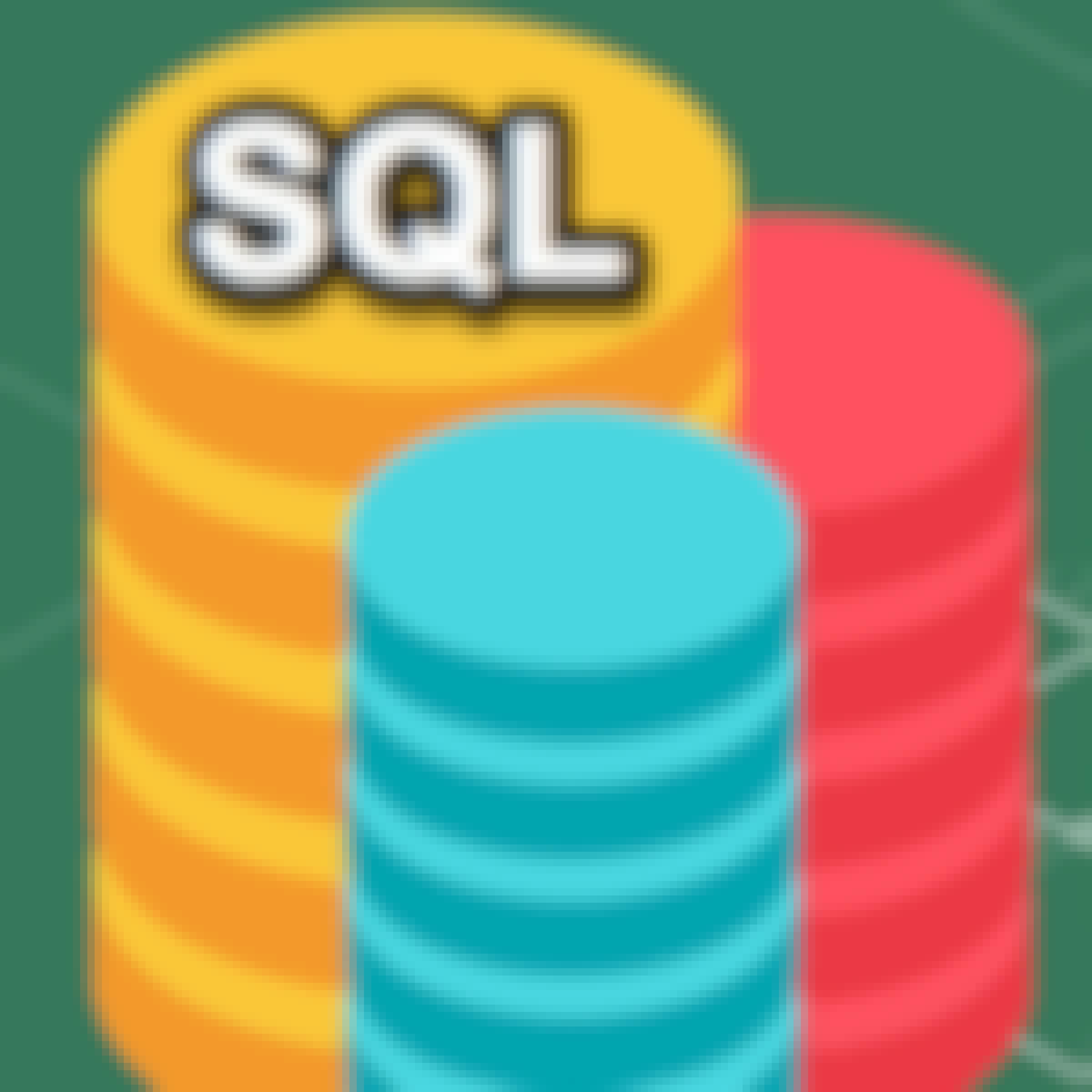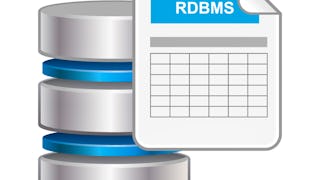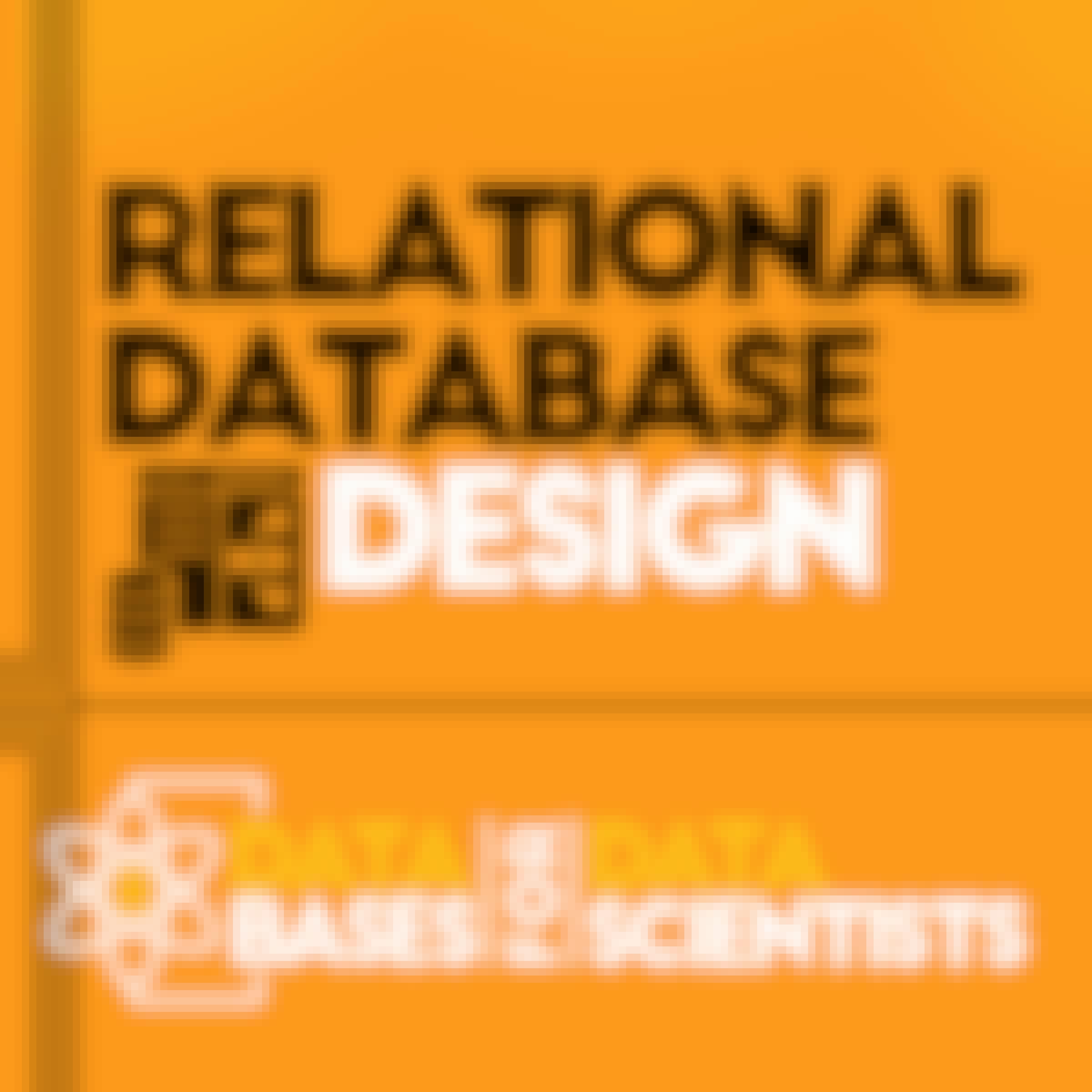- Browse
- Database
Results for "database"
 Status: Free TrialFree Trial
Status: Free TrialFree TrialSkills you'll gain: SQL, Relational Databases, Stored Procedure, Databases, Query Languages, Jupyter, Data Manipulation, Data Analysis, Pandas (Python Package), Transaction Processing, Python Programming
4.7·Rating, 4.7 out of 5 stars23K reviewsBeginner · Course · 1 - 3 Months
 Status: Free TrialFree Trial
Status: Free TrialFree TrialSkills you'll gain: Database Design, Database Management Systems, SQL, Relational Databases, Databases, MySQL, Database Administration, Data Integrity, Query Languages, Data Manipulation
4.7·Rating, 4.7 out of 5 stars1.4K reviewsBeginner · Course · 1 - 3 Months
 Status: Free TrialFree Trial
Status: Free TrialFree TrialSkills you'll gain: MySQL, Database Management, Database Administration, Data Warehousing, Linux Commands, Data Integrity, Unit Testing, Algorithms, Software Versioning, Command-Line Interface, Software Visualization, Linux, Pseudocode, Query Languages, Collaborative Software, Django (Web Framework), Database Architecture and Administration, Programming Principles, Computational Thinking, Test Driven Development (TDD)
4.6·Rating, 4.6 out of 5 stars7.6K reviewsBeginner · Professional Certificate · 3 - 6 Months
 Status: Free TrialFree Trial
Status: Free TrialFree TrialSkills you'll gain: MySQL, Database Management, Stored Procedure, Database Design, Database Systems, Relational Databases, SQL, Database Development, Database Administration, Query Languages, Data Management, Data Integrity, Data Validation
4.8·Rating, 4.8 out of 5 stars559 reviewsBeginner · Course · 1 - 4 Weeks
 Status: Free TrialFree Trial
Status: Free TrialFree TrialSkills you'll gain: Database Administration, Relational Databases, Database Management, Database Architecture and Administration, MySQL, Database Systems, IBM DB2, Operational Databases, PostgreSQL, Stored Procedure, Data Storage Technologies, Disaster Recovery, Role-Based Access Control (RBAC), Performance Tuning, Authentications, User Accounts
4.5·Rating, 4.5 out of 5 stars260 reviewsIntermediate · Course · 1 - 3 Months
 Status: Free TrialFree Trial
Status: Free TrialFree TrialSkills you'll gain: Database Design, IBM DB2, Relational Databases, Databases, Database Management, PostgreSQL, MySQL, SQL, Database Architecture and Administration, Data Manipulation, Data Modeling, Data Import/Export, Data Integrity
4.6·Rating, 4.6 out of 5 stars779 reviewsBeginner · Course · 1 - 4 Weeks
What brings you to Coursera today?
 Status: Free TrialFree TrialU
Status: Free TrialFree TrialUUniversity of Colorado System
Skills you'll gain: Database Design, Relational Databases, Data Modeling, Database Management Systems, Database Management, Oracle Databases, SQL, Data Integrity, PostgreSQL, Conceptual Design
4.6·Rating, 4.6 out of 5 stars3.4K reviewsIntermediate · Course · 1 - 3 Months
 Status: FreeFreeC
Status: FreeFreeCClemson University
Skills you'll gain: Database Design, Database Management Systems, MySQL, Database Theory, Relational Databases, Databases, Data Modeling, Database Architecture and Administration, SQL, NoSQL, Diagram Design
Build toward a degree
4.5·Rating, 4.5 out of 5 stars44 reviewsIntermediate · Course · 1 - 3 Months
 Status: Free TrialFree TrialStatus: AI skillsAI skills
Status: Free TrialFree TrialStatus: AI skillsAI skillsSkills you'll gain: Extract, Transform, Load, Data Warehousing, Web Scraping, Database Administration, Data Engineering, Database Design, Relational Databases, Linux Commands, Data Pipelines, SQL, Database Management, Apache Kafka, Apache Airflow, Bash (Scripting Language), Database Architecture and Administration, Shell Script, IBM DB2, Generative AI, Data Import/Export, Data Security
4.6·Rating, 4.6 out of 5 stars61K reviewsIntermediate · Professional Certificate · 3 - 6 Months
 Status: Free TrialFree TrialU
Status: Free TrialFree TrialUUniversity of Colorado Boulder
Skills you'll gain: Database Design, Database Management Systems, Relational Databases, Database Theory, Databases, Database Architecture and Administration, Data Modeling, Data Integrity, Diagram Design
4.6·Rating, 4.6 out of 5 stars340 reviewsBeginner · Course · 1 - 4 Weeks
 Status: Free TrialFree Trial
Status: Free TrialFree TrialSkills you'll gain: Vector Databases, AI Personalization, Embeddings, Hugging Face, MongoDB, NoSQL, PostgreSQL, Relational Databases, Generative AI, SQL, Databases, LLM Application, Applied Machine Learning, Database Design, Database Management, Apache Cassandra, Text Mining, Artificial Intelligence, Machine Learning, Data Science
4.7·Rating, 4.7 out of 5 stars70 reviewsIntermediate · Specialization · 1 - 3 Months
 Status: Free TrialFree TrialG
Status: Free TrialFree TrialGGoogle Cloud
Skills you'll gain: Google Cloud Platform, Cloud Infrastructure, Application Deployment, Prompt Engineering, Kubernetes, Containerization, Database Architecture and Administration, MySQL, Cloud Computing Architecture, Dataflow, PostgreSQL, Identity and Access Management, Cloud Deployment, Data Migration, Cloud Management, Cloud Security, Cloud Applications, Operational Databases, Database Design, Database Management
4.7·Rating, 4.7 out of 5 stars49K reviewsIntermediate · Specialization · 3 - 6 Months
In summary, here are 10 of our most popular database courses
- Databases and SQL for Data Science with Python: IBM
- Introduction to Databases: Meta
- Meta Database Engineer: Meta
- Database Structures and Management with MySQL: Meta
- Relational Database Administration (DBA): IBM
- Introduction to Relational Databases (RDBMS): IBM
- Database Management Essentials: University of Colorado System
- Database Management Systems: Clemson University
- IBM Relational Database Administrator with GenAI: IBM
- Relational Database Design: University of Colorado Boulder
Frequently Asked Questions about Database
A database is an organized collection of structured information or data, typically stored electronically in a computer system. Databases are crucial because they enable efficient data management, retrieval, and manipulation, which are essential for businesses and organizations to make informed decisions. In today's data-driven world, understanding databases is vital for leveraging data to gain insights, improve operations, and enhance customer experiences.
Careers in the database field are diverse and can include roles such as Database Administrator, Data Analyst, Data Engineer, and Database Developer. These positions often involve managing databases, ensuring data integrity, and optimizing database performance. Additionally, with the rise of big data, roles like Data Scientist and Business Intelligence Analyst are increasingly reliant on strong database skills.
To excel in database-related roles, you should focus on acquiring skills such as SQL (Structured Query Language), database design principles, data modeling, and performance tuning. Familiarity with various database management systems (DBMS) like MySQL, PostgreSQL, Oracle, and Microsoft SQL Server is also beneficial. Understanding data security and backup strategies is crucial for protecting sensitive information.
Some of the best online database courses include the IBM Relational Database Administrator Professional Certificate and the Database systems Specialization. These programs provide comprehensive training in database management, design, and optimization, catering to various skill levels.
Yes. You can start learning database on Coursera for free in two ways:
- Preview the first module of many database courses at no cost. This includes video lessons, readings, graded assignments, and Coursera Coach (where available).
- Start a 7-day free trial for Specializations or Coursera Plus. This gives you full access to all course content across eligible programs within the timeframe of your trial.
If you want to keep learning, earn a certificate in database, or unlock full course access after the preview or trial, you can upgrade or apply for financial aid.
To learn about databases, start by exploring foundational concepts through online courses or tutorials. Engage with practical exercises to apply what you learn. Consider joining forums or study groups to discuss topics with peers. Hands-on experience with real databases, whether through projects or internships, will also enhance your understanding and skills.
Typical topics covered in database courses include database design, normalization, SQL querying, data integrity, and performance optimization. Advanced courses may also explore big data technologies, cloud databases, and specific database management systems. Understanding these topics will provide a solid foundation for a career in database management.
For training and upskilling employees, programs like the Google Cloud Database Engineer Specialization and the Oracle Database Administration from Zero to Hero Specialization are excellent choices. These courses are designed to equip learners with practical skills that can be directly applied in the workplace.










